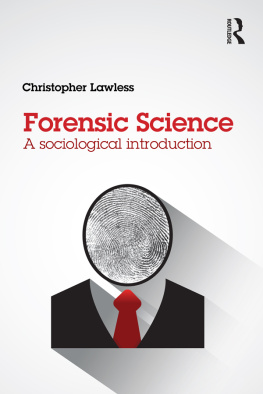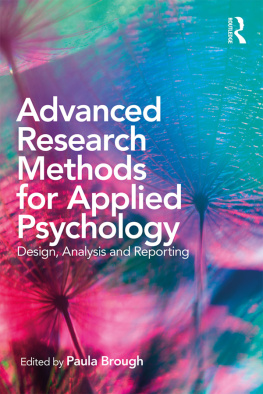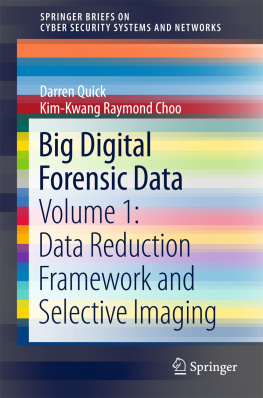
Research in Practice for Forensic
Professionals
This book explores applied research methods used in forensic settings prisons, the probation service, courts and forensic mental health establishments and provides a comprehensive how-to guide for forensic practitioners and researchers.
It provides practitioners and researchers with grounding in the practical techniques appropriate for research in applied forensic settings. This includes knowledge and skills of the research process and the wide range of research methods (both quantitative and qualitative) being applied in this arena. The text provides a critical understanding of the problems, challenges and ethical issues that can arise and ideas for managing these. Specific attention is paid to empirical research within forensic populations and settings, including researching vulnerable groups (e.g. offenders and the mentally ill in secure settings), evaluating treatment programmes and the uses and problems of randomised controlled trials.
The book is clearly structured, with each methodology chapter describing the background of the approach; the type of research questions addressed; design principles and issues; the types of analysis that can be utilised; strengths and limitations of the method; future directions and further sources of information. Through the inclusion of case studies and illustrative examples from forensic researchers and practitioners who have extensive experience of conducting applied research, this book tackles real-life problems typically faced by researchers and practitioners.
Research in Practice for Forensic Professionals is an essential one-stop resource for practitioners (such as psychologists, nursing and medical staff, prison and probation workers, social workers and occupational therapists) who have an interest in research and in evaluating their own work and the services in which they work. It will also be of interest to students studying areas of applied research, such as forensic psychology or applied criminology, and those teaching them.
Kerry Sheldon has worked as Research Fellow at Rampton High Secure Hospital. She has worked for the probation service in sex offender treatment and as a lecturer in psychology and criminology. Jason Davies is a Consultant Forensic and Clinical Psychologist and Lead Psychologist in Rehabilitation/Recovery and Low Secure Services with Abertawe Bro Morgannwg University Health Board. Kevin Howells trained initially as a clinical psychologist before specialising in forensic work. He has worked as a practitioner in a range of forensic mental health services in the UK and the USA as well as holding a number of academic positions and publishing extensively in the field.
Issues in Forensic Psychology
Edited by Richard Shuker and H.M.P. Grendon
Issues in Forensic Psychology is a book series which aims to promote forensic psychology to a broad range of forensic practitioners. It aims to provide analysis and debate on current issues and to publish and promote the work of forensic psychologists and other associated professionals.
The views expressed by the authors/editors may not necessarily be those held by the Series Editor or NOMS.
1. Research in Practice for Forensic Professionals
Edited by Kerry Sheldon, Jason Davies and Kevin Howells
Research in Practice for
Forensic Professionals
Edited by
Dr Kerry Sheldon, Dr Jason Davies
and Professor Kevin Howells
First published 2011
by Routledge
2 Park Square, Milton Park, Abingdon, Oxon, OX14 4RN
Simultaneously published in the USA and Canada
by Routledge
711 Third Avenue, New York, NY 10017
Routledge is an imprint of the Taylor & Francis Group, an informa business
2011 for editorial selection and matter, Kerry Sheldon, Jason Davies and Kevin Howells; individual chapters, the contributors
The right of Kerry Sheldon, Jason Davies and Kevin Howells to be identified as editors of this work has been asserted by them in accordance with the Copyright, Designs and Patent Act 1988.
All rights reserved. No part of this book may be reprinted or reproduced or utilised in any form or by any electronic, mechanical, or other means, now known or hereafter invented, including photocopying and recording, or in any information storage or retrieval system, without permission in writing from the publishers.
Trademark notice: Product or corporate names may be trademarks or registered trademarks, and are used only for identification and explanation without intent to infringe.
British Library Cataloguing in Publication Data A catalogue record for this book is available from the British Library
Library of Congress Cataloging in Publication Data
Research in practice for forensic professionals / edited by
Kerry Sheldon, Jason Davies and Kevin Howells.
p. cm.
ISBN 978-0-415-67271-9 (hbk.) ISBN 978-0-415-67272-6 (pbk.)
1. Criminal justice, Administration ofResearchMethodology.
I. Sheldon, Kerry. II. Davies, Jason. III. Howells, Kevin.
HV7419.5R47 2011
363.25072dc22
2011008100
ISBN 13: 978-0-415-67271-9 (hbk)
ISBN 13: 978-0-415-67272-6 (pbk)
ISBN 13: 978-0-203-80532-9 (ebk)
Typeset in Times New Roman
by Cenveo Publisher Services.
KS: For Imogen
JD: For Susie, Bryn and Freya
KH: For Maya and Jay, natural investigators
Contents
PART I
Introduction to forensic research
PART II
Risk, investigative and criminal justice research
PART III
Approaches at the qualitative level
PART IV
Assessing individual change
PART V
Approaches at the group level
Figures
Tables
Boxes
Editors
Dr Kerry Sheldon trained in Investigative Psychology at the University of Liverpool before obtaining her PhD in Psychology at Loughborough University. At the time of writing, Kerry worked as Research Fellow at Rampton High Secure Hospital. Since publication she has commenced her professional Doctorate in Clinical Psychology (DClinPsy) at the University of Nottingham. She has worked in the Probation Service in sex offender treatment and has worked as a Lecturer in Psychology and Criminology. She is a Fellow of the Higher Education Academy and has held a number of honorary academic and research appointments. Her areas of specialism are Internet sex offenders and service evaluation. In addition, her research interests include paedophilia, violent and sexual fantasies and self-harm. She has academic publications in the field of paedophilia including Sex Offenders and the Internet (Wiley and Sons, 2007) as well as a number of journal papers and book chapters covering a wide variety of Forensic Psychology topics.
Dr Jason Davies is a Consultant Forensic and Clinical Psychologist with ABM University Health Board. He has worked in the Personality Disorder Directorate at Rampton High Secure Hospital, in DSPD services and as Service Lead for Psychology and Psychological Therapies in a Medium Secure Hospital. Jason currently is Lead Psychologist in a Rehabilitation/Recovery and Low Secure Service in South Wales. He has worked as a part time lecturer (at the University of Sheffield) and currently holds a number of honorary academic and research appointments. His areas of specialism are working with complex needs including offending behaviour, dual diagnosis and personality disorder; service development; training and individual and service evaluation. He has an interest in engagement and motivation, clinical supervision, staff development and working with staff teams. His research interests include psychometric assessment, sadistic attitudes and behaviour and idiographic assessment. He has published qualitative and qualitative research on forensic and non-forensic topics and chapters on methods for evaluating individual change.








